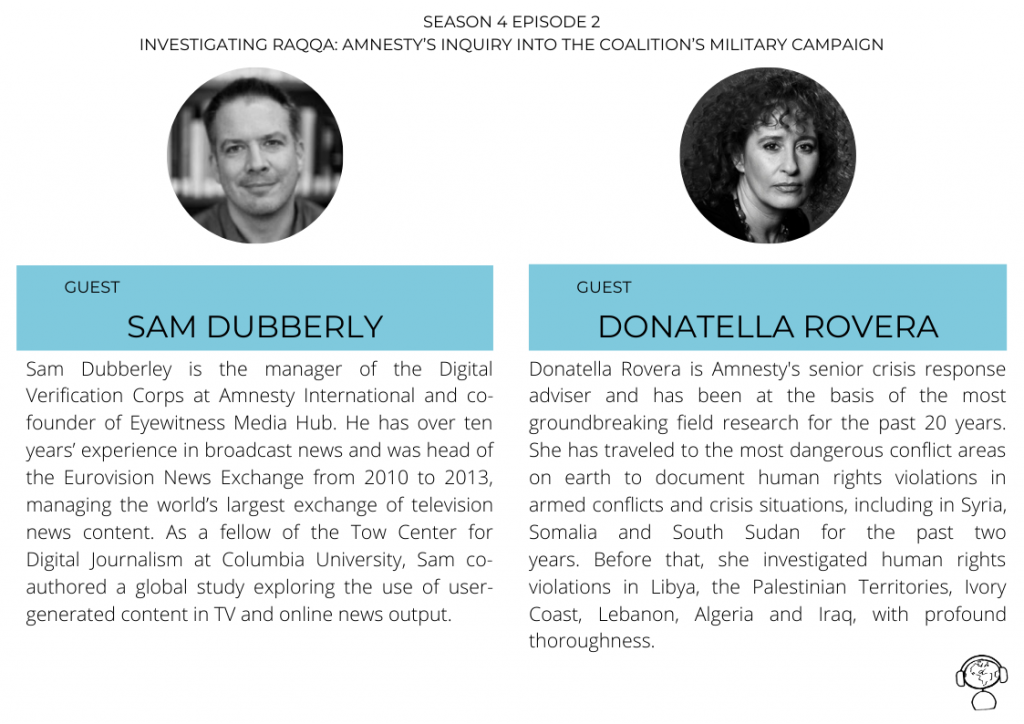From June to October 2017, the US-led Coalition launched an aggressive and highly destructive military campaign in Raqqa, Syria to oust the so-called “Islamic State” from the city. Amnesty International and the Digital Verification Corps came to Queens’ College, Cambridge for the opening of an exhibition featuring photographs, interactive screens, and even a Virtual Reality experience. This episode of Declarations explores the event, giving you an insight into the panel discussions and visitors’ impression, and thus uncovers a unique perspective on the impacts of the ongoing Syrian conflict.
The so-called Islamic State (IS) occupied Raqqa, Syria’s sixth largest city, in March 2013. From then on, the city’s 250,000 – 300,000 civilians suffered under the powerful presence established by the ‘caliphate’, which was ruling through oppression and violence. In 2017, a coalition headed by the U.S., the U.K. and France launched a military attack that encompassed four months of heavy shelling, with disastrous consequences. 1,600 civilian lives were lost and many more were injured. Those that survived the attack were left with a city in ruins – more than 80% of the city was destroyed via aerial bombardments – making healthcare, education and employment inaccessible. While the coalition has promised to reconstruct the cities’ infrastructure, civilians are left on their own in their efforts to rebuild their homes and lives.
“Even though these actions were regarded as legal in the international sphere, they do not reflect a way of life that we would want for ourselves”
Jing, Producer of Declarations
The situation in Raqqa needs to be paid more attention, for several reasons. Firstly, it sheds light on the role that the Coalition – led by some of the most heavily-equipped military actors – played in the Syrian civil war. While former defence secretary General James Mattis claims to have done “everything humanly possible” to “avoid civilian casualties at all costs”, witness testimonials and on-the-ground research shows otherwise. Furthermore, the war in Raqqa represents a global trend of modern urban warfare, painfully revealing some of its most destructive features: Artillery strikes launched from up to 40 km away. As a result, no American soldier risked their lives on the ground nor witnessed the impact of their action. Simultaneously, however, the use of artilleries is “inaccurate to the point of being indiscriminate” (Amnesty International). Each shell has a marginal bearer of more than 100 meters, being launched into neighbourhoods where 5 meters can make the difference between a military base and the home of an innocent family.
“In five months, they fired 30,00 artillery shells on ISIS targets… They fired more rounds in five months in Raqqa than any other Marine artillery battalion since the Vietnam War.”
Sgt Major John Wayne Troxell, November 2017 (Source: Amnesty International)
In order to create a holistic picture of the city-wide destruction of the military campaign, Amnesty carried out one of the most ambitious research projects. One important facet of this was the Digital Verification Corps – an open source investigation conducted by university students from South Africa over Hong Kong to Cambridge. The podcast discusses the vital contribution that this new strategy of data analysis has made possible, with comments from both Amnesty staff and students. Amnesty’s investigation was also supported by the ‘Strike Tracker’ project, in which the public could assist in analysing satellite images of Raqqa. Such forms of coalition are mutually beneficial to Amnesty and the researchers, contribution to fighting human rights violations and increasing awareness of these issues.
“It is ultimately very easy to show destruction, rebels and victims, really easy to feel emphatic about that. But it is very difficult to get a sense of understanding, to really grasp intuitively the scale of destruction and responsibility, which should be extended more broadly across societies in the world.”
Max, Producer of Declarations

What you can do to help:
- Digital Verification Workshop – https://www.eventbrite.co.uk/e/digital-verification-workshop-tickets-78947489065
- Amnesty Strike Tracker Project –https://www.amnesty.org/en/latest/news/2018/11/syria-thousands-of-digital-activists-to-track-how-us-led-air-strikes-destroyed-raqqa/
Links for further information
- Amnesty International on Raqqa – https://raqqa.amnesty.org
- Airwars on UK involvement – https://airwars.org/wp-content/uploads/2018/09/Credibility-Gap-Airwars-submission-to-UK-Parlt-Defence-Select-Committee-Sept-2018.pdf
- The Global Coalition – https://theglobalcoalition.org/en/
- Stephen Graham (2004) ‘Cities, War and Terrorism’ – https://onlinelibrary.wiley.com/doi/book/10.1002/9780470753033
